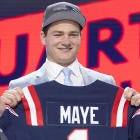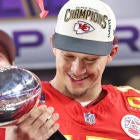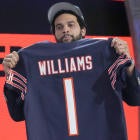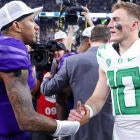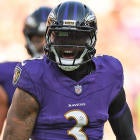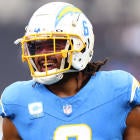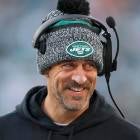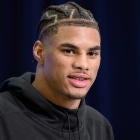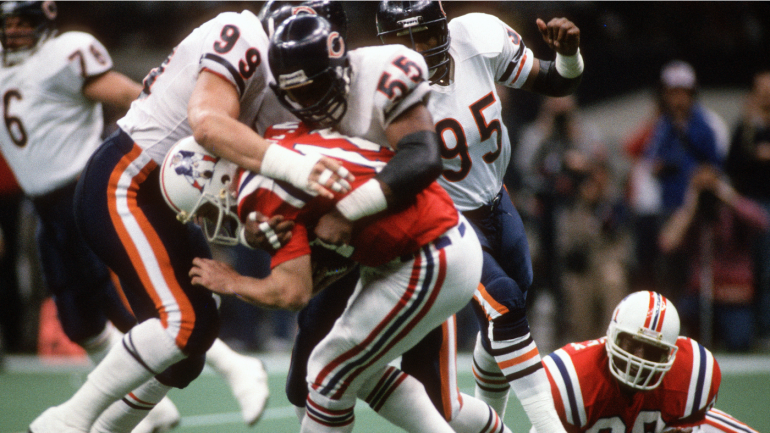
On more than one occasion, sports fans either heard or read a variation of the following statement: "Get used to what you're seeing right now, folks. This team is going to be here for a while."
Sometimes, these predictions have come to fruition. Legendary sportscaster Curt Gowdy said something to that effect after the Steelers won the first of their first four Super Bowls during the 1970s. The first sentence in Paul Zimmerman's Sports Illustrated piece on Super Bowl XXVII began with a foreshadowing of what was to come for the '90s Cowboys.
While some teams have managed to duplicate their success, other teams have fallen into the one-and-done category of champions that never made it back to the pinnacle of their sport. And while it doesn't take away from their accomplishment, the fact that these championship teams could not parlay their title into at least one more Super Bowl appearance has left something to be desired.
Here's our ranking of the best one-hit wonders during the Super Bowl era: Teams that won just one title though they had the talent for more (note: these franchises may have won other titles in different eras, but not with the same group). Along with a few bonafides and brief summaries of what made them champions, we've also included the main reasons why each team fell short in the years after its day in the sun. One team you won't find here is the 2019 Chiefs, given that their championship window is still very much open.
Honorable mention: 2000 Ravens
- 16-4 overall record
- Featured the league's top-ranked defense
- Outscored their four playoff opponents 95-23
Led by Ray Lewis and fellow Hall of Famer Rod Woodson, linemen Rob Burnett, Sam Adams, Tony Siragusa and Michael McCrary, linebackers Peter Boulware and Jamie Sharper, and defensive backs Duane Starks and Chris McAllister, the Ravens defense set the 16-game regular-season record for fewest points allowed (165). While their offense went an entire month without scoring a touchdown, the unit found its footing under Trent Dilfer, who went 11-1 as the starter. Baltimore started a modest 5-4 but entered the playoffs on a seven-game winning streak. Baltimore coasted past a talented Broncos team in the wild card round before upsetting the mighty Titans in the divisional round. Baltimore then went to Oakland, where they allowed a mere field goal in a 13-point win over the Raiders. Baltimore's defense pitched a shutout in Super Bowl XXXV, with Lewis taking home MVP honors.
Defense was clearly its strength, but Baltimore had a complete team. The Ravens scored touchdowns in all three phases of their 34-7 Super Bowl win over the Giants, as Jermaine Lewis' kickoff return for a score occurring mere seconds after the Giants scored their only touchdown on special teams. Along with Dilfer's steady play, the Ravens offense featured the talented running back duo of Jamal Lewis and Priest Holmes, receivers Qadry Ismail and Brandon Stokley, Hall of Fame tight end Shannon Sharpe and Hall of Fame lineman Jonathan Ogden.
Why they didn't win more championships: Baltimore was the first defending champion to change quarterbacks. Dilfer's replacement, Elvis Grbac, threw more interceptions (18) than touchdowns (15) during his first season in Baltimore. Grbac and the offense scored a mere three points in their 27-10 divisional round playoff loss to Pittsburgh. By the time Baltimore upgraded to former Titans quarterback Steve McNair, the Patriots had risen to supremacy.
No. 22: 2000 @Ravens, @SuperBowl XXXV Champions #RavensFlock
— NFL (@NFL) November 16, 2019
📺: #NFL100 Greatest Teams on @NFLNetwork pic.twitter.com/s6SgtMCj6h
10. 2017 Eagles
- 16-3 overall record
- Boasted the league's third-ranked offense and fourth-ranked defense
- Became the second team to win the Super Bowl with a backup quarterback
After league MVP contender Carson Wentz led them to an 11-2 start, the Eagles went 5-1 after Wentz went down with an injury. With Nick Foles now leading the way, the Eagles joined the 1990 Giants as the only teams to win the Super Bowl without the quarterback who led them to the majority of their regular-season wins. Following a five-point win over the defending NFC champion Falcons in the divisional round, the Eagles dominated the Vikings in the NFC Championship Game. Facing the defending champion Patriots in Super Bowl LII, Foles' 373 yards and three touchdown passes earned him MVP honors. The Eagles' "Philly Special" became an instant Super Bowl classic.
Already owners of arguably the league's best roster, the Eagles became a Super Bowl front-runner after trading for Pro Bowl running back Jay Ajayi before the deadline. With Ajayi and LeGarrette Blount leading the way, the Eagles boasted the league's third-ranked rushing attack. The duo combined to rush for 147 yards and a score on 23 carries in Super Bowl LII. Philadelphia's defense, led by linemen Fletcher Cox and Brandon Graham along with safety Malcolm Jenkins, allowed the fourth-fewest points during the regular season. They then allowed just 17 points in Philadelphia's playoff wins over Atlanta and Minnesota.
Why they didn't win more championships: Philadelphia's title defense ended in the 2018 NFC divisional round. Similar to the previous season, Foles again performed well in relief of Wentz, whose early injury in the Eagles' wild card game largely contributed to Philadelphia's 17-9 loss to the Seahawks. The Eagles scored just 16, 14, and 9 points in their three playoff games following Super Bowl LII.
"What a season. It was a dream season." 🦅
— NFL Network (@nflnetwork) November 9, 2019
The 2017 @Eagles went from underdogs to champions #NFL100 🏆
📺: NFL 100 GREATEST TEAMS on NFL Network pic.twitter.com/hykbZ8pDKT
9. 2009 Saints
- 16-3 overall record
- Featured the league's top-ranked offense
- Defeated three future Hall of Fame quarterbacks in the playoffs
The 2009 Saints roared out to a 13-0 start before coasting to the NFC's No. 1 seed entering the playoffs. In the playoffs, New Orleans blew out Kurt Warner and the rest of the defending NFC champion Cardinals before edging past Brett Favre and the Vikings in a classic conference title game. The Saints overcame a 10-point deficit to defeat Peyton Manning and the Colts to win the franchise's first Super Bowl. Drew Brees won MVP honors after throwing for 288 yards and two scores while completing 82% of his passes. The Saints' successful onside kick (the earlier-attempted onside kick in Super Bowl history) set up the Saints' go-ahead touchdown. Tracy Porter's 74-yard pick-six with three minutes left sealed New Orleans' 31-17 win.
Brees received stellar protection all season from an offensive line that featured Pro Bowlers Jonathan Goodwin, Jahri Evans and Jon Stinchcomb. The Saints' offense, predicated on spreading the wealth while keeping defenses on their heels, also featured running backs Reggie Bush, Mike Bell and Pierre Thomas, receivers Marques Colston, Devery Henderson and Robert Meachem, and tight end Jeremy Shockey. Defensively, the Saints were led by Pro Bowlers Jonathan Vilma, Roman Harper and Darren Sharper along with Porter, defensive end Will Smith and linebacker Scott Fujita.
Why they didn't win more championships: Brees and Co. were the victims of several heartbreaking playoff losses during the 2010s. It started with their wild card loss to the seven-win Seahawks in 2010. It continued with a four-point loss to the 49ers in the 2011 divisional round. There was also the "Minneapolis Miracle" in the 2017 playoffs as well as the missed pass interference call that contributed to the Saints' three-point loss to the Rams in the 2018 NFC Championship Game. The Saints' defense also contributed to New Orleans' inability to make it back to the Big Game, as the unit finished in the bottom five of the NFL in points allowed five times during the 2010s.
“We were playing for the city of New Orleans.” - @Reggie Bush⁰⁰
— NFL Network (@nflnetwork) November 16, 2019
Three years after Hurricane Katrina, the 2009 @Saints brought a title home 🏆 #NFL100⁰⁰
📺: NFL 100 GREATEST TEAMS on NFL Network pic.twitter.com/uO8srxwaHs
8. 2002 Buccaneers
- 15-4 overall record
- Included three Hall of Famers on defense
- Scored a record three defensive touchdowns in Super Bowl XXXVII
After several disappointing finishes, the Buccaneers finally broke through in 2002, winning the franchise's first championship behind a talented defense and Jon Gruden's creative offensive mind. In fact, a mismatch Gruden found in the middle of the Eagles defense led to a key 71-yard completion from Brad Johnson to Joe Jurevicius in Tampa Bay's 27-10 over the rival Eagles in the NFC Championship Game. In Super Bowl XXXVII, Gruden's understanding of the Raiders offense (he was Oakland's head coach from 1998-01) helped his defense intercept league MVP Rich Gannon a Super Bowl-record five times.
The Buccaneers' star-studded defense featured Hall of Famers Warren Sapp, Derrick Brooks, John Lynch, perennial Pro Bowlers Simeon Rice and Ronde Barber, 2002 Pro Bowler Shelton Quarles and Super Bowl XXXVII MVP Dexter Jackson. While overshadowed by their defense, the Buccaneers offense had some solid players in quarterback Brad Johnson, fullback Mike Alstott, receivers Keyshawn Johnson and Keenan McCardell and center Jeff Christy.
Why they didn't win more championships: While their defense remained top-notch, Tampa Bay's offense floundered in the years after their championship. From 2003-07, the Buccaneers offense finished 18, 23, 20, 31, and 18 in the league in scoring, respectively. Tampa Bay made the playoffs just twice during that span and failed to win a playoff game.
With Jon Gruden on the Tampa Bay sidelines, the @Buccaneers turned in a dominant performance to win the franchise’s first ring in Super Bowl XXXVII.
— NFLonCBS (@NFLonCBS) February 2, 2021
On Sunday, the Bucs will go for title number two. pic.twitter.com/7z8Kce8233
7. 2006 Colts
- 16-4 overall record
- Featured the HOF connection of Peyton Manning and Marvin Harrison
- Won four playoff games that included a come-from-behind win over the Patriots
This was far from Manning's first rodeo, as the Colts had endured several disappointing playoff losses before finally breaking through in 2006. But the Colts were still set up to have multiple championship runs entering the 2006 season. At 30, Manning was at the top of his game; he won Super Bowl MVP two weeks after outdueling Tom Brady in what was an epic AFC Championship Game. Harrison was 34, but 28-year-old Reggie Wayne (whose 47-yard touchdown catch jump-started the Colts offense in Super Bowl XLI) had blossomed into one of the game's top receivers. The combo of Dominic Rhodes and Joseph Addai -- a duo that gained 264 total yards in Super Bowl XLI -- had filled the void left by Hall Fame running back Edgerrin James. Indianapolis' defense was stacked with good players largely in their prime, a group that included 2007 Defensive Player of the Year Bob Sanders, defensive ends Robert Mathis and Dwight Freeney, linebackers Gary Brackett and Cato June, and defensive backs Antoine Bethea and Marlin Jackson.
The Colts' main kryptonite -- they finished last in the league in run defense during the regular season -- was remarkably one of the team's strengths during the postseason. The Colts held NFL rushing leader Larry Johnson to just 32 yards in their 23-8 wild card win over the Chiefs. Indianapolis' defense then kept the Ravens out of the end zone in the divisional round before coming up with a last-minute interception of Brady to complete the Colts' thrilling 38-34 comeback win over the Patriots in the AFC Championship Game. After allowing the Bears to jump out to a quick 14-6 lead, the Colts defense allowed just three points during the final 45 minutes of Super Bowl XLI.
Why they didn't win more championships: Manning was outdueled by Philip Rivers in the Colts' 28-24 loss to the Chargers in the divisional round of the 2007 playoffs. The Colts were again upset by Rivers and the Chargers in the wild card round of the 2008 playoffs in what was the final game on the sideline for Hall of Fame coach Tony Dungy. Indianapolis made it back to the Super Bowl in 2009 against the Saints but was bedeviled by the earliest-attempted onside kick in Super Bowl history, a dropped pass at a crucial point in the game and a pick six with the Colts down by a score and threatening to tie the game. The Colts' declining defense contributed to a 10-6 record and eventual upset loss to the Jets in the 2010 wild card round. Manning's season-long injury in 2011 abruptly ended his illustrious run in Indianapolis.
An epic AFC Championship.
— NFL (@NFL) November 9, 2019
A Super Bowl in the pouring rain.
The 2006 @Colts overcame everything to win their first Super Bowl in over 30 years. #Colts
📺: NFL 100 GREATEST TEAMS | Continues FRIDAY at 8pm ET on NFL Network #NFL100 pic.twitter.com/ACE0zzDYny
6. 1968 Jets
- 13-3 overall record
- Featured the league's second-ranked offense and fourth-ranked defense
- Defeated 18-point favorite and NFL champion Colts in Super Bowl III
Football fans can thank Broadway Joe and the rest of the Jets for helping make the sport the spectacle that it is today. After a 3-2 start, Hall of Fame coach Weeb Ewbank (who led the Colts to back-to-back titles in the late '50s) led his team to a 10-1 finish. In the playoffs, Namath's touchdown pass to Don Maynard gave the Jets a come-from-behind victory over the defending AFL champion Raiders in the league title game. Namath then guaranteed victory over Don Shula's Colts, the NFL champions who lost just one game during the '68 season.
Namath was the headliner, but the Jets were hardly a one-man show. They proved that in Super Bowl III, as the Jets defense -- a unit that featured four Pro Bowlers in linemen Gerald Philbin, John Elliott, Verlon Biggs, and linebacker Al Atkinson along with defensive backs Johnny Sample, Randy Beverly and Jim Hudson -- forced five Colts turnovers that included three interceptions off of NFL MVP Earl Morrall. The Colts got another interception off of legend Johnny Unitas, who led the Colts to their only score. With Maynard blanketed by the Colts, Namath looked early and often to George Sauer, who caught eight passes for 133 yards. Hall of Fame left tackle Winston Hill anchored a Jets line that gave Namath sturdy protection while also opening up running lanes for Matt Snell, who rumbled for 121 yards that included the Jets' only touchdown.
Why they didn't win more championships: Namath and the Jets offense failed to score a touchdown against the Chiefs' mighty defense in their 13-6 loss to Kansas City (who ultimately became the second and final AFL team to defeat the NFL in the Super Bowl) in the '69 playoffs. The AFL - NFL merger and Namath's ailing knees quickly closed the Jets' championship window.
Jets-Colts. 18-point underdogs. The guarantee.
— New York Jets (@nyjets) October 5, 2019
You know how it finished.
No. 6 on the NFL's 100 Greatest Games list: Super Bowl III pic.twitter.com/8FfpXY9yc0
5. 2013 Seahawks
- 16-3 overall record
- Featured the league's top-scoring defense
- Outscored their three playoff opponents 89-40
Seattle appeared poised to host several Super Bowl parades after the Seahawks' dismantling of the Broncos in Super Bowl XLVIII. After outlasting the Saints and defending conference champion 49ers in the NFC playoffs, Seattle soared past the favored Broncos in what was one of the most unexpected outcomes in Super Bowl history. The tone was set on a safety on the game's first play, as the Seahawks raced out to a 15-0 lead less than 18 minutes into the game. Game MVP Malcolm Smith's 69-yard pick gave Seattle a commanding 22-0 halftime lead. Percy Harvin's 87-yard kickoff return for a score at the start of the second half effectively ended the contest. The 43-8 victory confirmed the 2013 Seahawks' standing as one of the Super Bowl era's greatest champions.
When summarizing the '13 Seahawks, It would be sacrilegious not to first mention the "Legion of Boom" defense that was spearheaded by Richard Sherman, Earl Thomas, Kam Chancellor, Bobby Wagner, K.J. Wright, Michael Bennett and Cliff Avril. The league's top-ranked defense was complemented by Seattle's bruising rushing attack that featured Marshawn Lynch, aka "Beast Mode." Seattle's offense also received a Pro Bowl season from Wilson, who took full advantage of a Seattle receiving corps that included Kearse, Golden Tate and Doug Baldwin. Pro Bowl center Max Unger presided over a Seattle offensive line that routinely opened passing lanes for Russell and cleared holes for Lynch.
Why they didn't win more championships: Malcolm Butler's interception of Wilson at the end of Super Bowl XLIX prevented the Seahawks from becoming the first team in a decade to repeat as champion. The 2015 Seahawks were ambushed by the eventual NFC champion Panthers (they trailed 31-0 less than 25 minutes into the game) in the divisional round. Lynch's retirement after the 2015 season largely contributed to the Seahawks' dip in offensive productive in 2016, as Seattle fell to the eventual NFC champion Falcons in the playoffs. In recent years, Seattle's defense that has often been the issue, as Pete Carroll has had to rebuild that side of the ball.
They played together. Grew together. Won together.
— NFL (@NFL) November 14, 2019
The 2013 @Seahawks changed the franchise forever.
📺: #NFL100 GREATEST TEAMS | TOMORROW at 8pm ET on @nflnetwork pic.twitter.com/uSPSPjtgVg
4. 1996 Packers
- 16-3 overall record
- Featured league MVP Brett Favre and HOF pass rusher Reggie White
- Won 10 games by at least 21 points
The preseason favorites to win Super Bowl XXXI, Favre and the Packers stormed out to an 8-1 start before injuries (specifically to Pro Bowl receiver Robert Brooks) temporarily decimated Green Bay's receiving corps. After consecutive setbacks, the Packers won their final eight games that included blowout wins over the 49ers and Panthers in the NFC playoffs. Matched up against a worthy competitor in New England, the Packers received big performances in all three phases to roll to a 35-21 win in Super Bowl XXXI. White recorded three sacks of Drew Bledsoe, who threw four passes that ended up in the hands of Packer defenders. Favre scored three touchdowns that included a 54-yard bomb to Andre Rison to open the game and an 81-yard completion to Antonio Freeman that gave the Packers the lead for good. Desmond Howard, far and away the NFL's best return man during the season, scored the game's final points on a 99-yard kickoff return near the end of the third quarter.
A complete team, the '96 Packers finished first in the NFL in total offense and defense. Favre, who won his second of three consecutive MVP awards, took advantage of a deep receiving corps that was led by Freeman, Brooks, Rison, Pro Bowl tight end Keith Jackson, Don Beebe, and Mark Chmura. The passing game was complemented by running backs Edgar Bennett and Dorsey Levens, who combined to tally 1,907 all-purpose yards and 13 touchdowns during the regular season. Green Bay's defense featured a big, physical line led by White, Gilbert Brown, Santana Dotson and Sean Jones. The Packers also possessed a dominant secondary that was led by All-Pro safety LeRoy Butler and fellow defensive backs Craig Newsome, Doug Evans and Eugene Robinson.
Why they didn't win more championships: Green Bay sorely missed Howard's special teams prowess after he signed with the Raiders during the ensuing offseason. Poor field position was one of the reasons why the Packers were upset by the Broncos in Super Bowl XXXII, 31-24. The Packers also fell victim to two first half turnovers by Favre that led to 10 Broncos points. Green Bay's defense also had no answer for Broncos running back Terrell Davis, who rumbled for 157 yards and three touchdowns despite missing most of the second quarter. Two losses to then-rookie Randy Moss and the Vikings forced the '98 Packers to start the postseason against the 12-win 49ers in the wild card round. After his touchdown pass to Freeman gave the Packers a four-point lead, Favre could only watch as Steve Young hit Terrell Owens for the game-winning score with eight seconds left. Coach Mike Holmgren departed for Seattle that offseason, as Green Bay would miss the playoffs the next two years.
No. 20: 1996 @packers, @SuperBowl XXXI Champions #GoPackGo
— NFL (@NFL) November 16, 2019
📺: #NFL100 Greatest Teams on @NFLNetwork pic.twitter.com/4504E3qMPc
3. 1969 Chiefs
- 14-3 overall record
- Featured eight Hall of Fame players
- Defeated the previous two AFL champions and the NFL champion Vikings in the playoffs
Three years after falling short in Super Bowl I, the Chiefs joined the '68 Jets as the only AFL teams to defeat an NFL team. A double-digit underdog, Hank Stram's team dominated a supremely talented Vikings team in Super Bowl IV. His defense, anchored by a slew of future Hall of Famers in linebacker Willie Lanier and Bobby Bell, defensive tackles Buck Buchanan and Curley Culp, and defensive backs Emmitt Thomas and Johnny Robinson, held the Vikings to a mere 13 first downs and 239 yards while forcing five turnovers. Offensively, Hall of Famer and game MVP Len Dawson completed nearly 71% of his throws against Minnesota's "Purple People Eaters" defense. Elusive running back Mike Garrett scored the game's first touchdown, while star receiver Otis Taylor's 46-yard score put the game away.
Before beating the Vikings, the Chiefs held Namath and the defending champions to just six points in the divisional round. A week later, facing a Raiders team that beat them twice during the regular season, Kansas City held Oakland to just seven points and 207 total yards. With the game tied and the Chiefs backed up near their own end zone, Taylor's balletic, 35-yard catch set up the Chiefs' go-ahead score.
Why they didn't win more championships: Age and the AFL - NFL merger largely contributed to the Chiefs' abrupt fade. Stram's team did have one last hurrah in 1971, as the Chiefs made it back to the playoffs before falling to Don Shula's Dolphins in the longest game in NFL history. Miami would go on to appear in the next three Super Bowls, while the Chiefs wouldn't make it back to the Big Game until the 2019 season.
No. 27: 1969 @Chiefs, @SuperBowl IV Champions #ChiefsKingdom
— NFL (@NFL) November 16, 2019
📺: #NFL100 Greatest Teams on @NFLNetwork pic.twitter.com/nX9vBsWffO
2. 1999 Rams
- 16-3 overall record
- Featured the league's top-ranked offense and fourth-ranked defense
- Scored a then-NFL record 526 points during the regular season
Kurt Warner and the Rams enjoyed a storybook season in 1999. The former grocery store clerk and arena league star quickly rose to fame after replacing injured starter Trent Green during the preseason. The 28-year-old Warner led a high-scoring St. Louis offense that also featured future Hall of Famers Marshall Faulk, Isaac Bruce and Orlando Pace. Warner took home his first of two league MVP awards, while Faulk (the MVP of the 2000 season) became the NFL's second player to run and receiver for more than 1,000 yards. The Rams offense also featured then-rookie Torry Holt, who caught the first touchdown of Super Bowl XXXIV.
The Rams offense got most of the headlines, but their defense was also one of the league's best. Led by Pro Bowlers Kevin Carter and Todd Lyght along with defensive linemen D'Marco Farr and Grant Wistrom, linebackers Mike Jones and London Fletcher and cornerback Dexter McClendon, the Rams allowed just two field goals in their 11-6 win over the Buccaneers in the NFC Championship Game. In Super Bowl XXXIV, Jones' tackle of Titans receiver Kevin Dyson just short of the end zone preserved the Rams' 23-16 win. Warner's 73-yard touchdown pass to Bruce moments earlier gave St. Louis the lead for good.
Why they didn't win more championships: The Rams were never quite as good as they were under 1999 NFL Coach of the Year Dick Vermeil, who retired shortly after Super Bowl XXXIV (only to return to the sidelines as the Chiefs coach in 2001). Their offense continued to set records for the next several years, but the Rams defense sagged to 31st in the league in 2000 and was one of the main reasons why St. Louis was upset in the wild card round. They managed to make it back to the Super Bowl in 2001 but were upset by Tom Brady and the Patriots. Steve Smith's touchdown in overtime in the Panthers' 2003 divisional round win in St. Louis effectively ended the "Greatest Show on Turf's" exciting yet abbreviated run.
“The whole team just had a swag to them, and it was electrifying!” 💥@Nelly_Mo on the 1999 St. Louis Rams 👇 #NFL100
— NFL Network (@nflnetwork) November 16, 2019
📺: NFL 100 GREATEST TEAMS on NFL Network pic.twitter.com/NRnlr52AkA
1. 1985 Bears
- 18-1 overall record
- Featured the league's top-ranked defense and second-ranked offense
- Allowed one touchdown during the playoffs
The '85 Bears were a juggernaut. Chicago's vaunted "46" defense, led by Hall of Famers Mike Singletary, Dan Hampton and Richard Dent along with fellow Pro Bowlers Steve McMichael, Otis Wilson and Dave Duerson, forced four shutouts that included two (one against the next season's Super Bowl champion) during the playoffs. Only Dan Marino found a way to best Buddy Ryan's defense, a unit that wreaked havoc over opposing offenses. Against the Patriots in Super Bowl XX, the Bears defense allowed a Super Bowl-low 7 yards rushing and 123 total yards.
Complementing the Bears defense was an offense that featured arguably the greatest running back in NFL history in Walter Payton, who at age 31 rushed for 1,551 yards while gaining over 2,000 all-purpose yards. Quarterback Jim McMahon led a solid passing attack that also featured speedy receiver Willie Gault, who caught four passes for 129 yards in Super Bowl XX. The Bears' skill players received stellar blocking from Hall of Fame left tackle Jimbo Covert and Pro Bowl center Jay Hilgenberg. Speaking of linemen, you can't mention the '85 Bears without mentioning William "The Refrigerator" Perry, whose 1-yard touchdown run put a thunderous stamp on Chicago's 46-10 win over New England.
Why they didn't win more championships: Ryan's departure to become the Eagles coach was a big blow to Chicago's title defense. McMahon's season-ending injury six games into the 1986 season -- along with Mike Ditka's decision to start Doug Flutie for the team's playoff loss to Washington -- was the nail in the coffin. Chicago's declining offense led to two more disappointing home playoff losses to Washington and San Francisco.
“A punky, rebellious, athletically gifted, smash mouth, boastful… a fantastic squad.”
— NFL Network (@nflnetwork) November 16, 2019
The 1985 @ChicagoBears was a very memorable team 👇 #NFL100
📺: NFL 100 GREATEST TEAMS on NFL Network pic.twitter.com/HB93MzCrkL














